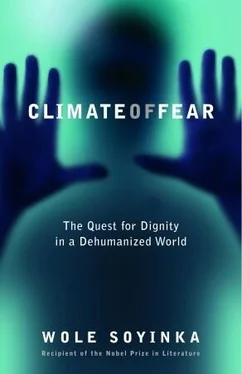The fault, of course, is not in religion, but in the fanatic of every religion. Fanaticism remains the greatest carrier of the spores of fear, and the rhetoric of religion, with the hysteria it so readily generates, is fast becoming the readiest killing device of contemporary times. Even after half a century, films that touch upon the era of Nazi glorification, with their orchestrated chant of Sieg heil, continue to send a chill of apprehension down the spines of all with a historical memory. Scenes of mass religious frenzy increasingly resurrect these nightmares, and if Khatami’s inspired Dialogue of Civilizations leads, eventually, to the dissociation of the chant of millions to the greatness of God from the gross ultranationalist politics lodged in the chant of Sieg heil, we will have lifted one corner, a not inconsiderable one, of the shroud of fear that now envelops life, and humanity.
Four
The Quest for Dignity
The Times newspaper of London, on Saturday, February 21 of this year, carried the story of the suicide of a teenager in Belfast, Northern Ireland. Apparently, it should have been a double suicide, but that youth, after yet another bout of humiliation from his tormentors, decided that he simply could not wait. He was one of a close-knit group of seven, the report continues, who had attended school together and continued to spend all their spare time together. Of the seven, only two still survive. The motor accident that earlier took the lives of three of them may not have been deliberate, but it is on record that one of those three had also once attempted suicide. All lived in fear of some degrading punishment by the local vigilantes known as the INLA. In one case, a fourteen-year-old boy suspected of being a police informer was tarred and feathered, dragged through the streets, then “kneecapped”—that is, shot through the back of the knee, crippling the youth for life. Here is what a consulting psychiatrist in north Belfast had to say:
In a culture where it is acceptable for a young man to be dragged down an alleyway and shot, children grow up believing there is no such thing as respect for human dignity. They… often develop anxiety and a fatalistic approach to their own lives.
Now, why did the psychiatrist settle on that word “dignity” over others in his clinical notebook? Why had this youth — as had others — chosen to embrace death rather than live but be publicly tarred and feathered and/or kneecapped, subjected thereafter to cruel taunts by his own-age mates — we learn — who called out to the fourteen-year-old, knowing he had been crippled, “Come out, Barney, come out and play”?
We are trying to come to grips with the concept of “dignity,” and why it appears to mean so much to the sentient human, almost right from childhood. Why has it been entrenched in so many social documents across cultures, civilizations, and political upheavals? Why was it given such prominence in the charter that resulted from one of the bloodiest revolutions in human history — the French — and was further enshrined in the document for the enthronement of peace after the Second World War, the Universal Declaration of Human Rights? In one form or another, the quest for human dignity has proved to be one of the most propulsive elements for wars, civil strife, and willing sacrifice. Yet the entitlement to dignity, enshrined among these human rights, does not aspire to being the most self-evident, essential need for human survival, such as food or physical health. Compared to that other candidate for the basic impulse of human existence — self-preservation — it may even be deemed self-indulgent.
Here is another incident from real life, involving, this time, not an individual but a nation, an attempt at breaking out from a walling in, a contesting of the reduction of volition, this time largely of the economic kind. About six years ago, I was approached by a Cuban ambassador to Nigeria with whom I had developed a warm relationship. He felt that I might know some influential individuals within the United States government or in the intellectual circles that relate to its policy makers. His government, he informed me, was anxious for a resolution of the state of undeclared war between the two nations (these formal and informal probes are part of public knowledge, so I am not revealing any privileged communication). Cuba had weathered the general economic sanctions imposed by the U.S. reasonably well, he said, but after the infamous Torricelli Act, whose provisions extended the ban on trade with Cuba even to her existing foreign partners, threatening them with sanctions unless they severed such relationships, that small island began to feel the economic stress of claustrophobia, and sought diplomatic means of breaking the deadlock.
The ambassador said, Cuba is ready to meet and talk with the U.S. on any platform, formal or informal, with no preconditions — oh, except one: Cuba will not compromise her dignity. It struck me as a remarkable statement, even then. We are a small people, he declared, we are powerless compared with the United States, but we will not compromise our dignity; we would rather starve to death.
That declaration— We shall not sacrifice our dignity — is very much the language of nations, or states, to one another. During conflict negotiations or their aftermath— and I refer here to those unpublicized sessions, familiar to arbitrators — that phrase, an insistent, minimal appeal, surfaces with remarkable constancy, even when all else has been surrendered: let us leave these negotiating chambers with, at the very least, our self-respect. It is very much the historic cry of a defeated people, defeated either through a passage of arms or on the diplomatic field, when they discover that they have no more bargaining chips left. What their representatives are saying is simply: the very least we can live with is an agreement that does not reduce us to slaves of imposition, but makes us partners of consent. Yes, we are compelled to make peace, we submit to force majeure, but leave us at least a piece of clothing to cover our nudity. This is the motivation behind every formula of diplomatic contrivance that is sometimes described as face-saving, and wise indeed is the victor who knows that, in order to shield his own rear from the elements, he must not denude his opponents.
Considerations of this intangible bequest, dignity, often remind me of a rhetorical outburst in the United Nations by a Nigerian representative — no, that desperate rhetoric did not lead to hysteria as identified in an earlier lecture, except if one chooses to remark the barely suppressed hysterical laughter in the hallowed halls of the General Assembly. The occasion was the nation’s arraignment before the General Assembly on charges of violations of human rights and the denial of democracy under the dictatorship of General Sanni Abacha. In what our apologist must have considered the definitive argument on the subject, he challenged his listeners to combat in more or less the following words:
What exactly is this democracy, these human rights that we’re talking about? Can we eat democracy? The government is trying to combat hunger, put food into people’s stomachs, and all we hear is democracy, democracy! Human rights! What exactly is this democracy? Does it prevent hunger? Is it something we can put in the mouth and eat like food?
I felt bound to come, quite unnecessarily, to the defense of the United Nations and wrote an article in response, remarking that I had dined in the cafeterias and restaurants of the United Nations on occasion, and had never seen democracy on the menu, nor indeed on any menu in restaurants all over the world. So, what, I demanded, was the point of that statement?
Well, while democracy as such may not be on the UN restaurant menu, it is nonetheless on its catering agenda. So is human dignity. Needless to say, both are inextricably linked. Indeed, human dignity appears to have been on everyone’s menu since the development of the most rudimentary society, recognized as such by philosophers who have occupied their minds with the evolution of the social order. Nothing is more fascinating, but permanently contentious, than the kind of binarism attributed to the motoring force of the evolution of this order by Hegel, Nietzsche, Hobbes, and Locke, among others. The historic man, according to these thinkers, would appear to be a product of a choice between abject submission or bondage, on the one hand, for the sake of self-preservation, and, on the other, a quest for dignity, even if this leads to death. Karl Marx, for his part, felt compelled to distance himself from their deductions, yet even he refused to ignore the importance of that element, human dignity, naming it as a reward that comes naturally with the evolution of man whose labor is un-governed by necessity. That is the phase when it becomes possible to celebrate the dignity of labor. What for us is worth noting today is simply the prodigious output of numerous minds on this theme, nearly all of whom emphasize that the pursuit of dignity is one of the most fundamental defining attributes of human existence.
Читать дальше












